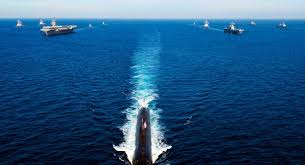
Beijing Cautions EU Against ‘Stirring Trouble’ in South China Sea

 :
| Updated On: 05-Jun-2025 @ 3:32 pm
:
| Updated On: 05-Jun-2025 @ 3:32 pmSHARE
China has issued a stern warning to the European Union (EU), urging it to cease “provoking trouble” in the South China Sea, following critical remarks made by EU foreign policy chief Kaja Kallas. Kallas had expressed concern over Beijing’s increasingly assertive and coercive behavior in the strategically vital region. The Chinese embassy in Manila, in a formal statement, demanded that the EU genuinely respect China’s territorial sovereignty and maritime rights and avoid actions that escalate tensions.
Beijing also targeted the Philippines, advising it to abandon the idea of depending on external powers to resolve disputes over the South China Sea’s sovereignty. The Chinese stance came in response to a recent meeting held earlier in the week between Kallas and Philippine Foreign Minister Enrique Manalo in Manila. The meeting led to the announcement of a new security and defense dialogue between the EU and the Philippines, aimed at tackling emerging threats such as foreign interference, cyberattacks, and disinformation campaigns.
During the discussions, both the EU and the Philippines voiced deep concern about China’s activities in the region, specifically accusing Beijing of taking “illegal, coercive, aggressive and deceptive” actions against Philippine vessels and aircraft engaged in lawful maritime operations. This includes frequent confrontations in disputed areas of the South China Sea, where China has been asserting sweeping territorial claims.
When questioned by reporters about the EU’s specific limits or “red lines” in the South China Sea, Kallas reaffirmed the EU’s dedication to promoting peace and upholding a rules-based international order. She stated that the EU rejects any unilateral attempt to alter the status quo, especially through coercive means. Her remarks reflected a growing alignment between the EU and its Indo-Pacific partners in resisting China’s increasingly dominant posture in regional waters.
The South China Sea is a resource-rich and geopolitically sensitive waterway, over which multiple countries assert overlapping territorial claims. Apart from the Philippines, nations such as Brunei, Indonesia, Malaysia, and Vietnam have competing claims in parts of the sea. However, China claims almost the entirety of the South China Sea, based on what it calls historical rights. These sweeping claims, which overlap with the exclusive economic zones (EEZs) of other Southeast Asian nations, have led to repeated confrontations at sea and rising diplomatic tensions.
Beijing’s aggressive approach has raised alarms not only among its immediate neighbors but also among global stakeholders like the EU, which increasingly views regional stability in the Indo-Pacific as essential to global trade and security. China, however, maintains that external actors like the EU have no legitimate role in the regional disputes and accuses them of destabilizing the situation.
In essence, the growing tension highlights a widening geopolitical divide between China and Western powers, with the South China Sea serving as a flashpoint for international rivalry. While the EU seeks to enhance cooperation with regional partners to promote a stable and lawful maritime order, China remains adamant about defending its expansive territorial claims, setting the stage for ongoing friction in one of the world’s most contested maritime zones.
Contact Us
House. No. : 163, Second Floor Haridev Rd, near Puberun Path, Hatigaon,Guwahati, Assam 781038.
E-mail : assaminkcontact@gmail.com
Contact : +91 8811887662
Enquiry
×
Reporter Login
×